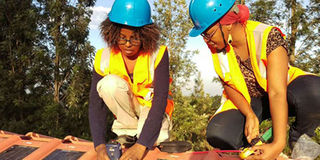Women speaking with one voice, common agenda way to go

Strauss Energy Limited workers instal solar energy systems on July 22, 2016. Kenyan women are as educated and qualified as the men in all sectors. PHOTO | FILE | NATION MEDIA GROUP
What you need to know:
Kenyan women are as educated and qualified as the men in all sectors of economic, social and political development and must be represented just like the other gender.
- It’s unfortunate that in this day and age, Kenyans are engaged in a discussion about a top institution that has highly qualified women refusing to involve them in decision-making.
I have followed closely the storm that has greeted the Nairobi Hospital’s recent announcement of their new board of directors. I could not help but ‘admire’ the management and, in particular, those who appointed the eight men — not a single woman — to the board of the top city hospital, for their ‘courage’.
PATRIARCHY
Did they not fear the backlash that would follow their action or were they just indifferent? Or could it be that they had reached a point of no return and had devised a way of dealing with any outcome — since it is not just a woman issue?
Those were the questions that went through my mind when I saw the announcement in a newspaper. I could not get an answer immediately. I still do not have one. But I was astounded by what I saw as quite audacious though not surprised.
There is a new reality, and it is this: However much one may try, it will be difficult to wish away the women of Kenya. And with it the importance — nay, reality — for a gender-equal society that must respect its own diversity. For those still craving and perpetuating patriarchy in society, it is time you understood that you can only do that in your very personal space — or in your imagination.
PETITION
While there are a few instances, such as in the Nairobi Hospital case, where one may get away with it, that will be after you have been reminded by other Kenyans that inclusivity is the key word. You will be educated on, and your attention drawn to, the fact that we are in the 21st Century, where gender equality is a fact.
And that is what happened as soon as the controversial list was published: A petition came hot on its heels. “Say No to Male Chauvinism At the Nairobi Hospital” — which by the time of writing this piece was doing the rounds on social media and receiving signatures — denounced the failure to do the right thing and that institutions must respect diversity.
The petitioners were loud and clear in their message: “Tell Nairobi Hospital to Stop Injustice Against Women. Add Capable Women to the Board.” I believe the message has hit home.
DIVERSITY
Kenyan women are as educated and qualified as the men in all sectors of economic, social and political development and must be represented just like the other gender. This must not be seen as a favour. It’s the law and the right thing to do. It’s unfortunate that in this day and age, Kenyans are engaged in a discussion about a top institution that has highly qualified women refusing to involve them in decision-making.
This raises an important question: How many other such institutions in the country do not respect diversity? If we go by the commitments that the government made at the International Conference on Population Development (ICPD+25) in Nairobi last month, we should be forging ahead in as far as empowering women and girls and advancing the rights and well-being of all is concerned. Those who do not believe in diversity and gender equality and keep resisting it will eventually be swept aside by the wind of change.
MARGINALISED
This brings me to the Building Bridges Initiative (BBI) report. Since Independence, women have made inestimable contributions to the country’s development and garnered, albeit with difficulties, gains for women, girls and children in general. And all these are well documented and clearly outlined in the Constitution.
That is why I dare say one of my key points of appreciation of the BBI is that women have seen the need for a common agenda. It is gratifying to note that women leaders from sectors, including politicians, refuse to be divided and resolve to speak with one voice and defend and protect the rights of women, girls, children and other marginalised groups enshrined in the supreme law.
CONVERSATION
The women, in one voice and common agenda, should continue their bid to ensure that their participation in the national conversation remains central. In coming together, they are sending a message that it is no longer business as usual.
Ms Rugene is a consulting editor. [email protected] @nrugene





